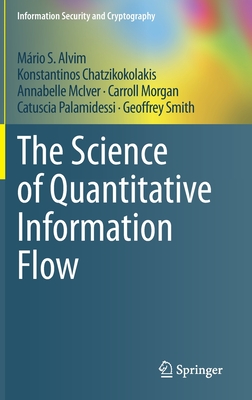The Science of Quantitative Information Flow
暫譯: 量化資訊流的科學
Alvim, Mario S., Chatzikokolakis, Konstantinos, McIver, Annabelle
- 出版商: Springer
- 出版日期: 2020-09-23
- 售價: $2,600
- 貴賓價: 9.5 折 $2,470
- 語言: 英文
- 頁數: 506
- 裝訂: Hardcover - also called cloth, retail trade, or trade
- ISBN: 3319961292
- ISBN-13: 9783319961293
-
相關分類:
機率統計學 Probability-and-statistics
立即出貨 (庫存 < 3)
商品描述
This book presents a comprehensive mathematical theory that explains precisely what information flow is, and how it can be assessed quantitatively (bringing precise meaning to the intuition that certain information leaks are small enough to be tolerated), and how systems can be constructed that achieve rigorous, quantitative information-flow guarantees in those terms. This theory addresses a fundamental challenge: functional and practical requirements frequently conflict with the goal of preserving confidentiality, making perfect security unattainable.
The authors include: a systematic presentation of how unwanted information flow, i.e. "leaks," can be quantified in operationally significant ways and then bounded, both with respect to estimated benefit for an attacking adversary and by comparisons between alternative implementations; a detailed study of capacity, refinement, and Dalenius leakage, supporting robust leakage assessments; a unification of information-theoretic channels and information-leaking sequential programs within the same framework; and a collection of case studies, showing how the theory can be applied to interesting realistic scenarios.
The text is a unified, self-contained, and comprehensive presentation, accessible to students and researchers with knowledge of discrete probability and some mathematical maturity, with numerous exercises to facilitate use as a course textbook.
商品描述(中文翻譯)
這本書提供了一個全面的數學理論,準確解釋了什麼是資訊流,以及如何以定量方式進行評估(為某些資訊洩漏是可以容忍的直覺帶來精確的意義),並且如何構建系統以在這些條件下實現嚴格的定量資訊流保證。這個理論解決了一個基本挑戰:功能性和實際需求經常與保護機密性的目標相衝突,使得完美的安全性無法實現。
作者包括:系統性地展示如何以操作上重要的方式量化不必要的資訊流,即「洩漏」,然後根據對攻擊者的預估利益以及不同實現之間的比較進行界定;對容量、精煉和Dalenius洩漏的詳細研究,支持穩健的洩漏評估;在同一框架內統一資訊理論通道和資訊洩漏的序列程序;以及一系列案例研究,展示如何將理論應用於有趣的現實場景。
這本書的文本是統一的、自足的和全面的,適合具備離散概率知識和一定數學成熟度的學生和研究人員,並包含大量練習題以便用作課程教材。
作者簡介
Mário S. Alvim is an assistant professor in the Computer Science Department of the Universidade Federal de Minas Gerais (UFMG) in Belo Horizonte. His current research interests include quantitative information flow and, in particular, its potential applications to fields other than security. Kostas Chatzikokolakis is a CNRS researcher at the École Polytechnique of Paris. He works on security and privacy, in particular quantitative information flow, location privacy and differential privacy. Annabelle McIver is a professor in the Department of Computing at Macquarie University in Sydney. She works on mathematical techniques for the verification of probabilistic systems. Carroll Morgan is a professor in the School of Engineering and Computer Science at the University of New South Wales, and is affiliated with the Trustworthy Systems Group of the CSIRO's Data61. His current interests are quantitative information flow, program derivation (including security) and proved correctness of multi-core operating-system kernels. Catuscia Palamidessi is director of research at INRIA Saclay. She is the leader of COMETE, a research team in the INRIA and École Polytechnique shared lab. Her main research interests are quantitative information flow, privacy, and concurrency theory. Geoffrey Smith is a professor in the School of Computing and Information Sciences of Florida International University in Miami. His current research interests include quantitative information flow and its applications to cryptography.
作者簡介(中文翻譯)
瑪利奧·S·阿爾維姆(Mário S. Alvim)是巴西米納斯吉拉斯聯邦大學(Universidade Federal de Minas Gerais, UFMG)計算機科學系的助理教授。他目前的研究興趣包括定量信息流,特別是其在安全以外領域的潛在應用。科斯塔斯·查齊科卡基斯(Kostas Chatzikokolakis)是巴黎高等工藝學院(École Polytechnique)的一名CNRS研究員。他的研究方向是安全和隱私,特別是定量信息流、位置隱私和差分隱私。安娜貝爾·麥克伊佛(Annabelle McIver)是澳大利亞麥考瑞大學(Macquarie University)計算系的教授。她專注於概率系統的驗證數學技術。卡羅爾·摩根(Carroll Morgan)是新南威爾士大學(University of New South Wales)工程與計算機科學學院的教授,並與CSIRO的Data61可信系統組有關聯。他目前的研究興趣包括定量信息流、程序推導(包括安全性)以及多核操作系統內核的正確性證明。卡圖西亞·帕拉米德西(Catuscia Palamidessi)是INRIA Saclay的研究主任。她是INRIA和巴黎高等工藝學院共享實驗室COMETE研究小組的負責人。她的主要研究興趣包括定量信息流、隱私和並發理論。傑弗瑞·史密斯(Geoffrey Smith)是邁阿密佛羅里達國際大學(Florida International University)計算與信息科學學院的教授。他目前的研究興趣包括定量信息流及其在密碼學中的應用。













